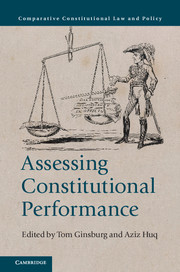Book contents
- Frontmatter
- Contents
- List of figures
- List of tables
- List of contributors
- Acknowledgments
- INTRODUCTION
- PART I DEFINING CONSTITUTIONAL PERFORMANCE
- PART II MANAGING SPECIFIC CONSTITUTIONAL CHALLENGES
- 6 Constitutional performance in transitions from military to civilian rule
- 7 Constitutional permissiveness, constitutional restrictiveness, and religious freedom
- 8 Performance of constitutions: Transitional provisions
- 9 Time and constitutional efficacy
- 10 Competitive democracy and the constitutional minimum core
- PART III CASE STUDIES
- Index
- References
7 - Constitutional permissiveness, constitutional restrictiveness, and religious freedom
from PART II - MANAGING SPECIFIC CONSTITUTIONAL CHALLENGES
Published online by Cambridge University Press: 05 August 2016
- Frontmatter
- Contents
- List of figures
- List of tables
- List of contributors
- Acknowledgments
- INTRODUCTION
- PART I DEFINING CONSTITUTIONAL PERFORMANCE
- PART II MANAGING SPECIFIC CONSTITUTIONAL CHALLENGES
- 6 Constitutional performance in transitions from military to civilian rule
- 7 Constitutional permissiveness, constitutional restrictiveness, and religious freedom
- 8 Performance of constitutions: Transitional provisions
- 9 Time and constitutional efficacy
- 10 Competitive democracy and the constitutional minimum core
- PART III CASE STUDIES
- Index
- References
Summary
INTRODUCTION
Constitutional ambiguity, vagueness, and indecision have been recently recognized by growing number of scholars and practitioners as a useful tool for mitigating conflicts over ideational issues during constitution-drafting processes (Bali and Lerner 2016; Brown 2008; Dixon and Ginsburg 2011; Lerner 2011; Shankar Forthcoming; Sunstein 2001). Under conditions of deep disagreements over the religious/national identity of the state or when the drafters are polarized around other ideological questions, it had been argued, drafters managed to craft democratic constitutional arrangements by using a variety of incrementalist or permissive constitutional strategies such as the use of vague and ambiguous language, the deferral of decisions to future parliaments, or even defining certain provisions as non-justiciable (Jacobsohn 2010; Lerner 2011). Yet what is the long-term impact of such incrementalist/permissive strategies? To what extent do they allow, for example, for the emergence or consolidation of a stable democratic order? Do they manage to promote or rather impede the protection of human rights, gender equality, or minority rights?
The long-term consequences of formal constitutions have become an emerging topic of interest in the field of comparative politics and comparative constitutionalism. Most works tend to explore the influence of particular provisions within formal constitutions, such as electoral rules or bill of rights (e.g. Horowitz 1985; Law and Versteeg 2013). By contrast to these studies, which look at the impact of formal written constitutional provisions, this chapter aims at exploring the consequences of decisions made by constitutional drafters which in many cases did not have a clear formal manifestation within a written constitution. In other words, the chapter aims at exploring the effect of framers’ decisions to leave clear choices on controversial issues outside the formal constitution by, for example, deferring these issues to future political deliberation, or by including ambivalent and opaque wording, or even conflicting provisions, in the constitutional text. Such permissive strategies were rarely employed by constitutional drafters when institutional issues, concerning the structure and mechanisms of government, were at stake, yet were often used in order to mitigate ideational conflicts, namely when the constitution was written under conditions of deep division over the basic values and norms that should underpin the state.
The chapter takes first steps in examining the impact of constitutional permissiveness in the area of one particular type of ideational conflicts – religious conflicts.
- Type
- Chapter
- Information
- Assessing Constitutional Performance , pp. 171 - 202Publisher: Cambridge University PressPrint publication year: 2016



